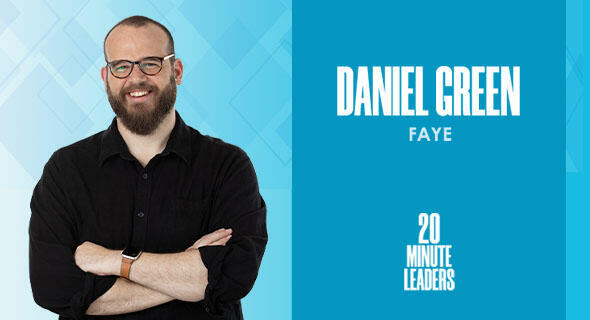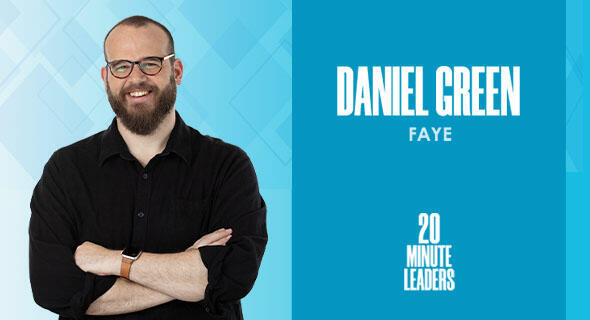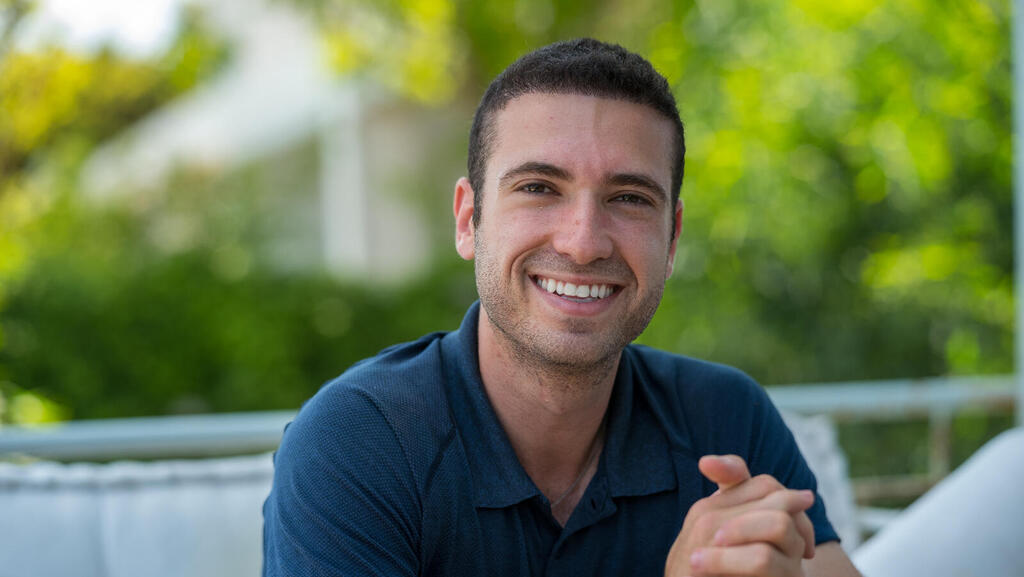
20-Minute Leaders
“Caring about the customer as a philosophy has so many amazing side effects.”
COVID highlighted not only the need for travel insurance, but the need for better travel insurance, says Daniel Green, co-founder and CTO at Faye.
COVID highlighted not only the need for travel insurance, but the need for better travel insurance, says Daniel Green, co-founder and CTO at Faye. So being a new player in the market is an advantage for the company. He explains that they also began with a customer-first philosophy that is beneficial for the company as well. Faye has streamlined the travel insurance buying process, offering travelers the best option for their trip rather than having to make a choice themselves. Green shares that it is common for travelers to deal with several companies through the travel insurance process, but Faye handles all aspects of the experience. This focus on customers has created loyalty that was rare in the travel insurance field, he says. Customers have even canceled claims after also being reimbursed by their airline because they appreciated how they were treated, and Green can’t imagine that happens often elsewhere.
I have to hear the story about predicting flight delays.
I've been lucky enough to be traveling a lot in my lifetime. It got to the point where I was traveling overseas multiple times sometimes in a week and you just started to pick up these little intuitions about what was making flights work and not work. At some point, it got to the point where I was able to get on a plane once in a while and ask the crew about a delay. They would say, "What delay?" It would turn out I was right.
One of those times, they actually rewarded you for picking up on that, right?
Yeah. The pilot was impressed enough that he came out after we were in the air to ask how I guessed it. I explained that I was going to miss a connection on a flight to New Jersey. I had a new niece that I really wanted to see. He put a call into the ground. When we landed at Heathrow, someone met me at the door with a car, drove me across the tarmac, we got to the x-ray machine for the second flight. We made it to the flight.
Tell me a little bit about travel insurance. What is the underlying understanding that you and your co-founder had when starting Faye?
We didn't start by doing travel insurance. We started with the insight that when things go wrong when you are traveling, what matters the most is having information available to you faster than everyone else. So we started off as a smart travel assistant. We launched at the very end of 2019, really January 2020. Suddenly COVID hit, and we still had people continue to use us. We were collecting amazing stories from people who were traveling with our smart assistant.
We really understood that it's all well and good to have the inside information or a prediction that something will go wrong with your flight, but the missing piece was insurance. So that was the birth of Faye as you know it today. We really understood that so many people saw insurance as a reimbursement service. Something that they dealt with only when they got home. We really wanted it to be something you used even if something didn't go wrong on your trip. We became about creating a consumer-centric smart offering that was top coverage, 24/7 assistance, no excessive paperwork, real time alerts: everything you need to make your trip a success.
What did you figure out about creating this trust with the consumers and that behavior shift?
The single biggest thing we did from a company point of view is that we actually built the ability to handle claims. We really started with this philosophy that in order to put the customer first, you have to be the person they talk to at all times. With a lot of other products, there was one organization selling you the policy, another that you'd need to contact if you had a problem, there was a third one if you needed to file a claim. The fundamental insight was that if you put the customer first, and if you made it that you were legally and practically allowed to handle every single part of the customer's journey with you, it was much easier to create a meaningful and memorable experience for them.
Tell me a little bit about the technology that goes into this personalized experience.
There's two parts to it. People got very used to the idea that you would enter dozens of pieces of information when buying a policy, and then you'd be shown three or four different plans. We actually made the decision to make you just one offer. We ask you five or six questions about your trip; we look into all the information that we might be able to gather about similar itineraries. We present what we believe is the best coverage for your needs. We just took all the thinking and questioning out of it.
The second part is what happens after that. We offer you, instantly, a mobile app to download. We ask you to enter your flight information and other bits of your booking so that we can start to send you alerts in advance. And if you need to pay for something on the trip, so long as it's approved, we can actually issue you an Apple Pay or a Google Pay card to use before you even get home.
People have to choose between getting your services versus the incumbents that have long sustaining brands. How do you get them to choose you?
I think COVID was not just a massive accelerator for people wanting travel insurance, but a lot of people had really bad experiences with their existing travel insurance. I do think one of the advantages we have at the moment is we are not one of the incumbents. There are a lot of people looking for a new player that's promising to make a difference. I think that's a really significant part of what leads people to trust us. The other part is we've worked really hard to create a friendly welcoming brand.
What role does this play in your own personal journey?
I grew up in Sydney, Australia. For everyone who grew up on an island, there's a huge desire to get out and travel. I was lucky enough to work in the entertainment industry. I did real-time programming for film, theater, and television. When you work in theater, if something goes wrong, you have literally minutes to fix it before the audience will start to complain.
About 12 years ago, I moved to Israel and started a company with my then and current CEO, and we were building crowdsourcing systems for governments and large corporations, and a lot of them wanted to meet in person. We found ourselves, on the front end, building this amazing expert network crowdsourcing platform. And on the backend, running a travel agency as we were getting everyone in and out.
I've always worked in data-heavy real time situations. Travel insurance is the ultimate culmination of that.
How do you see technology being a part of the psychology and the trust? What is your role as a technology leader in making that happen?
Travel insurance has traditionally been a bit of a less sophisticated insurance product. A lot of them just don't differentiate between what airline you are flying, where you are going to. Part of that is understanding how we can start to collect, map, and model the data today that will allow us to eventually have much more sophisticated underwriting and pricing and really just optimize.
The second part is how you can scale customer experience. Right now, with how many things are going wrong, you don't want to be manually processing everyone's baggage forms. What are all the things you can automatically collect in advance so that you can still get the paperwork prepared without the customer having to suffer through those processes?
What do you think is going to really make Faye win at the end?
I really believe that that concept of caring about the customer as a philosophy has so many amazing side effects or consequences for the company. We've had people who we've denied claims and they've still said, "Wow, just thanks for caring." We've had people where we've approved claims and they've said, "The airlines just paid me back, so I'd like to cancel the claim because you guys were so nice that I don't want to double dip." I can't imagine that happens with a lot of other companies.
Michael Matias, Forbes 30 Under 30, is a Venture Fellow at Innovation Endeavors as well as investment Venture Partner at Secret Chord and J-Ventures. He studies Artificial Intelligence and Human-Computer Interaction at Stanford University, and was an engineer at Hippo Insurance. Matias previously served as an officer in the 8200 unit. 20MinuteLeaders is a tech entrepreneurship interview series featuring one-on-one interviews with fascinating founders, innovators and thought leaders sharing their journeys and experiences.
Contributing editors: Michael Matias, Megan Ryan














